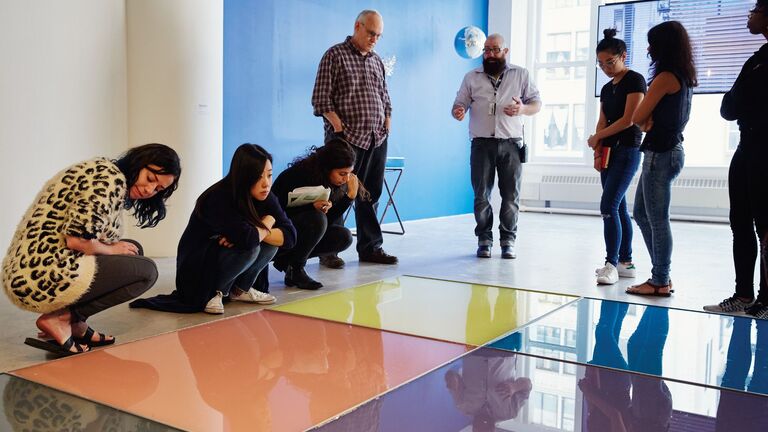
Capstone
Senior Capstone
Background
The Capstone course (CAPSTONE 4900 or DEPT 4900), recommended for the final semester of study at SAIC is an intensive mentoring class focused on the development and/or presentation of culminating student work at the end of their undergraduate studies. The course focuses on assessing the strengths and weaknesses of previous work, developing a focused project or body of work, preparing to present one's work publicly, and sustaining a creative practice after school.
Depending on the department, various Capstone course formats will be offered, including three-hour seminars, three-hour studio seminars, six-hour studios, and six-hour studio symposia. Courses listed as CAPSTONE 4900 are intended to be interdisciplinary and open to all seniors who have completed Professional Practice. Discipline-specific courses with departmental prerequisites are listed with the departmental heading, DEPT 4900.
Capstone is the third and final course in the three-course sequence of Academic Spine courses (Sophomore Seminar, Professional Practice, and Capstone), which is required for all freshmen who began their undergraduate degrees at SAIC in Fall 2015 and after (transfer students must take Research Studio for Transfer Students, Professional Practice, and Capstone).
Senior Capstone courses are offered in both the fall and spring semesters, to give students flexibility in incorporating this required course into their schedule. CAPSTONE 4900 should always be taken when the student has at least 90 credits completed. Capstone courses do not have to be taken in the student’s last semester at SAIC, but many students plan for this outcome. A minority of Senior Capstone options are linked to the SAIC Undergraduate Exhibition, and the Undergraduate Division and Office of Registration and Records coordinates to ensure students registering in these courses will also be registered for the corresponding Exhibition (fall or spring).
Course Description
The Capstone course assesses your strengths and weaknesses in your studio, scholarly, and/or pedagogical practice through intensive mentoring. You will assemble and document your capstone body of work, and prepare a plan to present your work in a wider context, such as in a capstone exhibition/production/event, in an on-campus or off-campus venue, or in a print or online publication. Due to the demands of this work, you should plan to take Capstone during your final semester of coursework at SAIC.
Many Capstone courses are intended to be interdisciplinary in that students with various material interests could take any of the sections and be engaged by the class conversation and critique. However, Capstone courses may also be highly discipline-specific, reflecting their status as culminating courses in a larger path of study. Students should carefully consider whether they are seeking and eligible for a discipline-specific Capstone within a department, or would benefit from a more interdisciplinary option. SAIC plans to ensure all seniors have viable options when completing this requirement, regardless of how discipline-specific their focus has been.
Students who wish to locate a faculty mentor within their particular area of study are advised to examine faculty bios and course descriptions in order to select a Capstone course that meets their identified goals and aspirations. Academic advisors can also be helpful resources for helping connect students’ interests and goals with relevant faculty, in this area of the curriculum and all others as well.
Course Learning Goals
At the conclusion of the Capstone course, students will be able to:
- Assemble and document a body of focused, self-initiated work that demonstrates conceptual understanding and technical ability (Evidence: Documentation of Practice Project).
- Engage in practices of critique that position one's own and others’ work in a diverse range of practices and their histories (Examples of evidence: Optional documentation/notes related to student participation in critiques).
- Demonstrate the ability to think, speak, and write clearly and effectively with regard to the creative, scholarly, and/or pedagogical practice (Evidence: Documentation of Practice written contextualization).
- Prepare a plan to present work in a wider context, such as in a capstone exhibition/production/event, in an on-campus or off-campus venue, or in a print or online publication (Examples of evidence: Participation in an SAIC year-end event such as the Fashion Show or BFA Exhibition; presentation of academic thesis or teaching demonstration; submission of proposal to display work in an on-campus or off-campus venue; publication of work in print or online)
Contact Us
For all questions about the undergraduate Academic Spine curriculum, please email saic-academicspine@saic.edu.